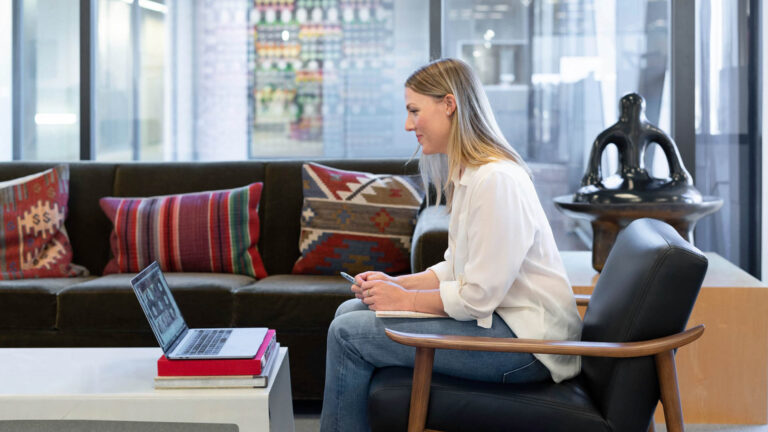As a job seeker, mastering the interview process is crucial to landing your dream job. The job interview is often the final hurdle between you and a job offer. Therefore, you need to ensure that you make a lasting impression and stand out from the competition.
With so much riding on your performance during a job interview, it is essential to know what to expect and how to prepare. This step-by-step guide provides you with everything you need to know to master the job interview process.
Over the course of the article, we will cover the different types of job interviews you may encounter, including phone interviews, initial screenings, and in-person interviews. We will also provide tips on how to prepare for an interview, how to answer common interview questions, and how to follow up after the interview.
Our goal is to help you approach each interview with confidence, articulate your skills and qualifications effectively, and ultimately receive a job offer.
So, whether you’re a recent graduate just starting out in your career, or a seasoned professional looking for a career change, this guide will help you master the interview process and land your dream job.


Researching the Company and Job Position
One of the most important steps in mastering the job interview process is to research the company and job position prior to your interview. This may seem like a basic step, but it is crucial to your success in the interview.
Why Researching is Important
Researching the company and job position allows you to gain a better understanding of the company’s values, culture, goals, and expectations. By doing so, you will be able to align your personal goals and values with those of the company, and better convey why you are a good fit for the position.
Additionally, researching the company can help you prepare better questions to ask during the interview. This shows the interviewer that you have done your due diligence and are truly interested in the company and the role.
Gathering Information about the Company
When researching the company, it is important to look beyond their website and explore other sources of information. Some resources to consider include:
- Social media accounts: Look at the company’s Facebook, Twitter, Instagram, and LinkedIn pages to get a sense of their brand image, values, and culture.
- News articles: Check out any recent news articles about the company to see where they stand in their industry and any recent developments or challenges.
- Glassdoor: Glassdoor is a website where employees can leave anonymous reviews of their employers. This can give you an idea of what it’s like to work for the company.
Understanding the Job Position
In addition to researching the company, it is also important to understand the job position you are applying for. This includes understanding the responsibilities and requirements of the position, as well as the qualifications and skills that are necessary to be successful in the role.
To better understand the job position, review the job posting and any additional information provided by the company. Reach out to current or former employees who may have experience in the role for their insights and perspectives.
By taking the time to research the company and job position, you will be better prepared to succeed in your interview and stand out as a strong candidate for the job.
Preparation for the Interview
One of the most crucial steps toward success in the job interview is preparation. This includes reviewing your resume and cover letter, dressing for success, and gathering necessary materials.
Reviewing Your Resume and Cover Letter
Before attending the interview, take some time to review your resume and cover letter. Ensure that your resume highlights your achievements and accomplishments clearly, and that your cover letter showcases your excitement and interest in the job.
It is also important to tailor your resume and cover letter to the specific job you’re applying for. Look for keywords and phrases in the job description and include them in your documents. This not only shows that you’ve read the job description thoroughly but also demonstrates your qualifications for the position.
Dressing for Success
Another essential aspect of interview preparation is dressing appropriately. Dressing professionally can make you feel more confident and put together, which can positively impact your performance in the interview.
Make sure that your clothes are clean, ironed, and fit properly. Wear neutral colors and avoid flashy jewelry or accessories that can be distracting. Ultimately, your outfit should convey that you’re serious about the job and that you are a professional.


Gathering Necessary Materials
Finally, make sure that you have all the necessary materials before the interview. Bring a few copies of your resume and cover letter, as well as a notepad and pen for taking notes.
If you’ve been asked to provide any additional documents, be sure to have those ready as well. This can include writing samples, references, or certifications.
By gathering all the necessary materials beforehand, you’ll demonstrate to the interviewer that you’re a well-prepared candidate who takes the job opportunity seriously.
Interview preparation is key to mastering the job interview process. By reviewing your resume and cover letter, dressing appropriately, and gathering necessary materials, you’ll be able to confidently showcase your skills and qualifications for the job.
Types of Job Interviews
The interviewing process can take many forms, depending on the company and the job position. Job seekers should be prepared to take part in different types of interviews during their job search. Here are the most common types of job interviews:
Phone Interviews
Phone interviews are usually the first step in the interviewing process. They give employers an idea of the candidate’s skills and qualifications, and enable them to assess the candidate’s suitability for the job. Phone interviews are usually shorter than in-person interviews, lasting around 30 minutes to one hour. In this type of interview, it’s important to speak clearly and confidently, making sure to answer the interviewer’s questions thoroughly.
Video Interviews
Video interviews are becoming increasingly popular, especially for remote positions or candidates who are not able to travel to an in-person interview. Video interviews can be conducted through various platforms, such as Zoom or Skype. This type of interview is almost identical to an in-person interview, but it is conducted via video. Candidates should dress professionally, find a quiet and well-lit space, and make sure their internet connection is stable.
In-Person Interviews
In-person interviews are the traditional form of job interview. Candidates will be asked to come to the office or a designated location to meet with the interviewer. In-person interviews are usually more formal and longer than phone and video interviews, lasting up to two hours. Candidates should dress professionally, arrive on time, and prepare for the interview by researching the company and its values.
Panel Interviews
Panel interviews are conducted by a group of interviewers, who will ask the candidate a series of questions related to the job position. Panel interviews are usually reserved for executive or managerial positions, and can be intimidating for candidates. However, candidates should see panel interviews as an opportunity to showcase their skills and knowledge to a wider audience.
Conclusion
Each type of job interview has its unique features, but they all have one goal in common: to assess the suitability of the candidate for the job position. Job seekers should be prepared for any type of interview, and approach each one with the same level of professionalism and confidence. With the right preparation and a positive attitude, job seekers can master the interview process and land their dream job.
Common Interview Questions and Answers
In any job interview, the interviewer will ask a range of different questions to evaluate your qualifications, readiness for the job, and overall potential. The three main types of questions that interviewers often ask include:
Behavioral Questions
Behavioral questions are designed to assess how you may react to certain situations in the workplace. These questions may require you to provide examples of how you have handled challenging situations in the past, or how you have worked with other team members to achieve a common goal. Sample behavioral questions may include:
- “Tell me about a time when you had to resolve a conflict with a coworker.”
- “Can you describe a time when you had to make a big decision under tight deadlines?”
- “Tell me about a time when you had to deal with an unhappy customer.”
Technical Questions
Technical questions are more specific to your role and responsibilities, and are designed to evaluate your skills and knowledge in certain areas. Depending on the job, these questions may involve coding challenges, project management scenarios, or other types of technical challenges. Sample technical questions may include:
- “Can you explain the difference between TCP/IP and OSI network models?”
- “How would you design a database schema to store user login credentials?”
- “Can you tell me about a coding problem you recently solved and how you approached it?”
Situational Questions
Situational questions may be similar to behavioral questions in that they ask how you would respond to certain situations. However, instead of asking about past experiences, situational questions ask you to imagine how you would handle hypothetical scenarios. Sample situational questions may include:
- “If you were managing a team and one member consistently missed deadlines, what steps would you take to address the issue?”
- “What would you do if a project you were working on suddenly changed direction halfway through?”
- “If a client was unhappy with their service, how would you go about resolving the issue?”
Sample Answers
When answering interview questions, it’s important to be prepared with specific examples and anecdotes that demonstrate your skills and experiences. Here are a few sample answers for common interview questions:
-
Q: “Can you tell me about a time when you had to resolve a conflict with a coworker?”
- A: “In my previous role, I worked with a teammate who had very different working styles than me. We often clashed on project deadlines and how to approach certain tasks. However, I found that by setting clear communication expectations and finding common ground on our goals, we were able to work together more effectively and avoid future conflicts.”
-
Q: “How would you design a database schema to store user login credentials?”
- A: “To store user login credentials, I would recommend using a combination of encryption and secure hashing techniques to ensure that passwords are stored securely.
Non-Verbal Communication
Non-verbal communication can significantly impact the outcome of a job interview. The way you present yourself and your body language can speak volumes even before you utter a single word. It is important to understand the importance of non-verbal communication to ensure that you are sending the right messages to your interviewer.
Importance of Non-Verbal Communication
Non-verbal communication includes everything from your posture, gestures, eye contact, and tone of voice. According to research, 93% of communication is nonverbal. This means that only 7% of the message is conveyed through words, while the remaining message is sent through non-verbal cues. Therefore, it is critical to understand the significance of these cues and their impact on how others perceive you.
During a job interview, non-verbal communication can be the key to making a positive impression on your interviewer. By presenting yourself with confidence and professionalism, you can demonstrate your suitability for the job. Conversely, poor non-verbal communication can send the opposite message and ultimately affect the interviewer’s decision.
Body Language Tips
Body language plays a significant role in nonverbal communication. Here are a few tips to help you present yourself positively during a job interview:
- Sit up straight: Slouching can convey a lack of interest or confidence.
- Maintain eye contact: Keeping eye contact with your interviewer can convey honesty and confidence.
- Nod your head: Nodding your head keeps the conversation flowing and shows you are engaged.
- Use appropriate hand gestures: Hand gestures can be a powerful tool, but don’t overdo it.
- Avoid fidgeting: Whether it’s tapping your foot or fiddling with your pen, fidgeting can convey nervousness or a lack of confidence.
By following these tips, you can ensure that your body language conveys your interest, confidence, and professionalism.
Facial Expressions
Facial expressions can also provide insight into your emotions and mood, and can communicate messages without words. Here are a few tips on managing your facial expressions during a job interview:
- Smile: A warm smile can put yourself and the interviewer at ease and create a positive impression.
- Maintain a neutral expression: Avoid displaying negative thoughts or judgments in your facial expressions.
- Use appropriate expressions: Appropriate expressions can help reinforce your words and show enthusiasm.
Mastering non-verbal communication during an interview is essential to creating a positive impression on the interviewer. By using positive body language and facial expressions, you can communicate your suitability for the job and increase your chances of success.
Questions to Ask the Interviewer
Asking questions during a job interview is just as important as answering them. Not only does it show the interviewer that you are genuinely interested in the position, but it also gives you an opportunity to learn more about the company culture and whether the job is a good fit for you. Here are some reasons why asking questions is important during an interview:
-
It shows that you have done your research: If you ask informed questions about the company, the products, the culture, or the industry, it demonstrates that you have taken the time to research the company before the interview. This can make a great impression with the interviewer.
-
It helps you learn more about the position: Questions about the day-to-day responsibilities, expectations, and goals of the position can help you understand what the job entails and whether it aligns with your interests and skills.
-
It displays your communication skills: Asking thoughtful questions is an excellent way to demonstrate your ability to communicate effectively, which is a highly valued skill in most workplaces.
When it comes to the types of questions you should ask during an interview, you want to avoid generic or obvious questions. Instead, focus on questions that will help you learn more about the job, the company, and the interviewer. Here are some types of questions to consider:
-
Company-related questions: These questions are aimed at learning more about the company’s mission, values, culture, products, customers, or industry.
-
Position-related questions: These questions are aimed at learning more about the day-to-day responsibilities, expectations, goals, challenges, or successes associated with the position.
-
Team-related questions: These questions are aimed at learning more about the team structure, communication, collaboration, or projects you will be involved in.
-
Future-related questions: These questions are aimed at learning about the growth opportunities, training, or development programs available at the company.
Here are some examples of questions you can ask during an interview:
-
Can you tell me more about the company culture and how it reflects in the team’s work?
-
What are some of the most significant challenges the team has faced, and how did you overcome them?
-
Can you describe the ideal candidate for this position in terms of skills, experience, and work style?
-
How does this position contribute to the company’s overall mission and goals?
-
Are there any opportunities for growth, development, or training within the company?
Remember, the goal of asking questions during an interview is to learn more about the company and the position while demonstrating your interest, curiosity, and communication skills. By preparing thoughtful and informed questions, you can set yourself apart from other candidates and leave a lasting impression on the interviewer.
Follow-Up After the Interview
After the interview, it is important to follow up with a thank you letter or email. This shows your appreciation for the interviewer’s time and reaffirms your interest in the position. Additionally, it serves as an opportunity to touch base on the next steps in the hiring process.
In deciding on next steps, consider the timeline given by the interviewer. If they mentioned a timeframe for when they plan to make a decision, respect that and avoid following up too soon. Alternatively, if there was no specific timeline mentioned, wait no more than a week before sending a follow-up message.
Below is an example follow-up email:
This follow-up message is an opportunity to demonstrate your professionalism and effective communication skills. Keep your tone polite and positive, while also emphasizing your enthusiasm for the role. Mentioning your understanding of the decision-making timeline shows that you are not only patient but also respectful of the interviewer’s time and process.
Mastering the job interview process requires thorough preparation, strong communication, and effective follow-up. By following these steps and sending a thoughtful follow-up message, you can increase your chances of landing the job you want.
Handling Difficult Interview Situations
Job interviews can be nerve-wracking experiences, and it’s not uncommon to encounter difficult situations during the interview process. Knowing how to handle these situations can impress the interviewer and increase your chances of landing the job. In this section, we will discuss four common difficult interview situations and offer tips on how to navigate them.
Discussing Salary
Salary negotiations can be one of the most uncomfortable aspects of the job interview process. To handle this situation, it’s important to be prepared and do your research beforehand.
Research the average salary range for the position and location, and be realistic about your expectations. Determine your desired salary range and have a clear understanding of your minimum acceptable salary.
When discussing salary with the interviewer, focus on your skills, experience, and the value you can bring to the company. Avoid disclosing your current salary, and instead, emphasize your worth in the marketplace. Be flexible in your negotiation and consider other benefits beyond salary, such as healthcare and retirement plans.
Being Nervous
Everyone gets nervous during job interviews, but it’s important to manage your nerves to present yourself as confident and capable.
Practice your interview skills beforehand by conducting mock interviews with friends or family. Research the company and their culture to gain a better understanding of their values and goals.
On the day of the interview, arrive early to familiarize yourself with the environment and take a few deep breaths to calm your nerves. Smile and make eye contact with the interviewer to establish rapport, and remember that the interview is an opportunity to showcase your strengths and accomplishments.
Handling Inappropriate Questions
Interviewers are prohibited from asking inappropriate or discriminatory questions, but it still may happen. If you encounter this situation, it’s important to handle it professionally and respectfully.
Politely decline if a question makes you uncomfortable, and redirect the conversation to focus on your skills and experience. If the question persists or crosses a legal line, report the incident to the HR department or relevant authority.
Dealing with Rejection
Unfortunately, rejection is a common part of the job interview process, but it doesn’t have to be the end of your job search.
Always follow up with the interviewer to express your gratitude for the opportunity and request feedback on your performance. Use the feedback to improve your interview skills and apply it to future interviews.
Remember that rejection doesn’t define your worth or abilities. Stay positive and focused on your goals, and keep searching for opportunities that align with your skills and values.
Handling difficult interview situations is a crucial part of mastering the job interview process. By being prepared, confident, and professional, you can navigate challenging situations and increase your chances of landing your dream job.
Tips for Virtual Interview
The virtual interview has become increasingly important in the digital age, and mastering this process is critical for job seekers looking to land their ideal position. In this section, we will explore three key tips to ensure you are fully prepared for your virtual interview.
1. Importance of Preparation
Preparation is key when it comes to virtual interviews. You should treat the virtual interview process with the same level of diligence and professionalism as an in-person interview – and this starts with being organized and well-prepared. It is important to familiarize yourself with the company and position you are applying for, as well as any trends or updates within the industry. Go through common interview questions and consider how you will respond to them. Rehearse your responses with a friend or family member, and make adjustments as necessary.
2. Dressing Professionally
Just because the interview is virtual, it does not mean you should dress any less professionally. In fact, dressing professionally can help boost your confidence and project a professional image to the interviewer. Ensure you dress appropriately for the role and company culture, and avoid wearing loud or distracting clothing. Opt for something comfortable, yet professional and conservative.
3. Eliminating Distractions
Virtual interviews come with the added risk of distractions, both from external sources and technology-related issues. Ensure you set up for the interview in a quiet and clean area, with minimal possible distractions. Mute your phone and disable any notifications if possible. Ensure your internet connection is strong and stable, and test all your equipment beforehand to avoid technology-related interruptions.
Preparation, dressing professionally and eliminating distractions are critical elements of ensuring a successful virtual interview experience. By following these tips, you can help increase your chances of securing your dream role and putting your best foot forward.
Handling A Prompt
One important aspect of the job interview process is the ability to handle a prompt provided by the company.
Example of a company prompt
A company prompt may take various forms, including a case study, a problem-solving exercise, or a task to complete within a certain timeframe. For instance, the prompt may ask you to analyze a specific business issue and propose solutions, or it may require you to showcase your technical skills by coding a program or designing a website.
Tips for preparation
To excel in handling a prompt, here are some essential tips to consider:
-
Understand the prompt: Make sure you fully comprehend the requirements and scope of the prompt. If you have any doubts or need clarification, don’t hesitate to ask the interviewer for more information.
-
Analyze the prompt: Once you understand the prompt, take time to analyze it and break it down into smaller components. Identify the key objectives, constraints, and potential challenges that you may encounter.
-
Research and prepare: Use your knowledge, expertise, and resources to research the prompt and gather relevant information that can help you develop a comprehensive solution. Depending on the nature of the prompt, you may need to research the company, industry trends, best practices, or technical tools.
-
Develop a strategy: Based on your analysis and research, create a clear and structured plan for handling the prompt. Define the steps you need to take, the resources you require, and the timeline to follow. Make sure your plan is realistic, flexible, and aligned with the company’s expectations.
-
Practice: To build your confidence and improve your performance, practice handling prompts before the interview. You can use mock prompts, online resources, or seek feedback from peers or mentors.
By following these tips, you can enhance your ability to handle prompts and demonstrate your skills and competencies to the company. Remember that handling a prompt is not only about the final result but also about the process and approach you use. Showcasing your critical thinking, creativity, and problem-solving skills can set you apart as a strong candidate for the position.
Related Articles
- Communications Specialist Resume: Best Examples in 2023
- Substitute Teacher Resume: Complete Writing Guide 2023
- Researching the Company: Impressing on Interviews in 2023
- Theatre Director Resume Examples: Requirements & Skills
- Warehouse Supervisor Resume: Expert Examples & Tips 2023







